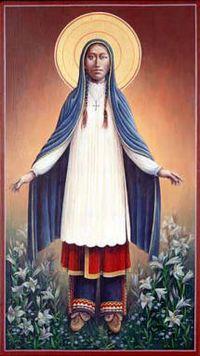Catholic Church prepares to canonize first Native American saint despite mixed reactions
Kateri Tekakwitha’s upcoming canonization has generated both excitement and controversy. She will become the first Native American saint later this year.
The Roman Catholic Church is ready to canonize its first Native American saint.
The Vatican recently announced that Kateri Tekakwitha, a Mohawk Indian, will be canonized later this year. Tekakwitha, known as the Lily of the Mohawks, was the daughter of a Mohawk chief born in upstate New York in 1656. She embraced Catholicism after smallpox left her disfigured and partially blinded, and later left her tribe to join a mission in Canada.
In December, Pope Benedict XVI determined that it was her miraculous intervention that saved the life of Jake Finkbonner in 2006. Finkbonner, a 5-year-old from Washington state, was struggling for his life after contracting a flesh-eating virus. He was expected to die and given last rites. The Finkbonners say that his recovery was swift after he received a small relic with Tekakwitha’s profile and name on it and prayers asking for her to intercede on his behalf. Doctors told the Vatican that they had no clear medical explanation for Finkbonner’s sudden recovery.
Native American Catholics are celebrating Tekakwitha’s sainthood, but her upcoming canonization has also sparked a great deal of controversy. Robert Roche,an Apache Indian and executive director of the American Indian Education Center, doesn’t believe it is a milestone to be celebrated. However, Kateri Mitchell, executive director of the Tekakwitha Conference and member of the Mohawk Nation, said the canonization will bring more healing.
Many are in agreement, as the Vatican has received numerous requests to canonize Tekakwitha for more than a century.
“Kateri Tekakwitha was a very holy woman and was able to survive the tragic disease of smallpox at a very early age. She lived a life in which she developed a very close relationship with her god,” Mitchell explained.
Tekakwitha also cared for the sick and elderly and devoted herself to a life of prayer. For Mitchell and many others, the canonization is long overdue.
“By the 1800s, her cause was introduced through some findings with the Jesuit relations. This young woman had survived a lot of suffering, and did a lot of fasting and prayer, which warranted a very spiritual journey that she was following,” Mitchell said.
To be declared a saint, a miracle must be attributed to the candidate after he or she has been beatified, or, declared by the Pope to be in a state of dying bliss. Takekwitha was beatified by Pope John Paul II in 1980.
Brian Bull, chair of the Native American Public Telecommunications group, has studied Takekwitha for some time. He told NPR that her first miracle occurred in 1680 after her smallpox blemishes reportedly disappeared from her face and body moments after her death.
“It’s also said on some accounts that mourners at her funeral also found themselves cured of various ailments,” he said.
Takekwitha’s last known miracle occurred when she saved Finkbonner’s life.
The canonization is a source of pride for many Native American tribes that have embraced the Catholic faith along with their native spirituality.
But Roche has reservations about the relationship between the tribes and the Catholic Church. He calls the Church “RICO”, or Racketeer Influenced and Corrupt Organizations.
“It is a difficult situation for me because I was a product of institutionalization and have a different opinion of the Catholic Church. The Catholics, as far as the documentation of the efforts of the Black Robes, the Jesuits, the servitude, and boarding schools, have stripped the Native Americans of their identity, culture and spirituality mostly through brute force,” he said. “There’s more controversy now about the genocide of the Catholic Church in Canada. The church was on the brink of going bankrupt because the Native Americans were finally able to file lawsuits and raise awareness of the injustices committed by the churches that systematically stripped Native Americans of their culture and spirituality,”
Bull admitted there are those who are critical of the Catholic Church, and see the canonization as an attempt to whitewash history.
“The Catholic Church did run a lot of controversial boarding schools from the late 1800s through the 1970s, where there are reports and accounts of children being taken away from their families, subjected to various abuses. And then, you know, many people see Christianity as a way of eroding in their traditional culture and religion, as well,” he said.
Tekawitha will be canonized on Oct. 21 along with six other candidates.
